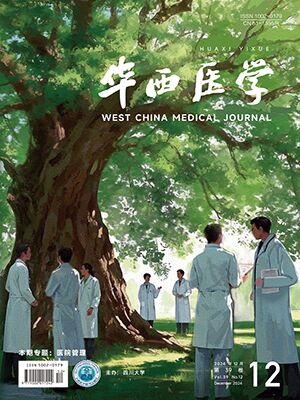| 1. |
Tang Y, Chen A, Zhu S, et al. Repetitive transcranial magnetic stimulation for depression after basal ganglia ischaemic stroke: protocol for a multicentre randomised double-blind placebo-controlled trial. BMJ Open, 2018, 8(2): e018011.
|
| 2. |
Vanderwerker CJ, Ross RE, Stimpson KH, et al. Combining therapeutic approaches: rTMS and aerobic exercise in post-stroke depression: a case series. Top Stroke Rehabil, 2018, 25(1): 61-67.
|
| 3. |
O’Reardon JP, Solvason HB, Janicak PG, et al. Efficacy and safety of transcranial magnetic stimulation in the acute treatment of major depression: a multisite randomized controlled trial. Biol Psychiatry, 2007, 62(11): 1208-1216.
|
| 4. |
Health Quality Ontario. Repetitive transcranial magnetic stimulation for treatment-resistant depression: a systematic review and Meta-analysis of randomized controlled trials. Ont Health Technol Assess Ser, 2016, 16(5): 1-66.
|
| 5. |
Perera T, George MS, Grammer G, et al. The clinical TMS society consensus review and treatment recommendations for TMS therapy for major depressive disorder. Brain Stimul, 2016, 9(3): 336-346.
|
| 6. |
Shen X, Liu M, Cheng Y, et al. Repetitive transcranial magnetic stimulation for the treatment of post-stroke depression: a systematic review and meta-analysis of randomized controlled clinical trials. J Affect Disord, 2017, 211: 65-74.
|
| 7. |
王新德. 各类脑血管疾病诊断要点. 中华神经科杂志, 1996(6): 379-380.
|
| 8. |
World Health Organization. Cerebrovascular disorders: a clinical and research classification. Geneva: World Health Organization, 1978.
|
| 9. |
中华医学会精神科分会. CCMD-3 中国精神障碍分类与诊断标准. 济南: 山东科学技术出版社, 2001: 64-67.
|
| 10. |
吴婷婷, 刘丹璐, 黄娇, 等. 偏倚风险评估工具在针刺 Cochrane 系统评价中的应用. 中国循证医学杂志, 2014(3): 361-364.
|
| 11. |
杨柳, 刘玉山, 史文宗, 等. 高频重复经颅磁刺激辅助治疗脑卒中后抑郁症疗效观察. 中国实用神经疾病杂志, 2018(1): 72-74.
|
| 12. |
Gu SY, Chang MC. The effects of 10-Hz repetitive transcranial magnetic stimulation on depression in chronic stroke patients. Brain Stimul, 2016, 10(2): 270-274.
|
| 13. |
李凡, 姚黎清. 重复经颅磁刺激联合氟西汀对卒中后抑郁的临床疗效研究. 临床精神医学杂志, 2017, 27(2): 144.
|
| 14. |
周丽华, 田青, 陈勋, 等. 重复经颅磁刺激治疗脑卒中后抑郁的临床疗效及磁共振波谱分析. 临床荟萃, 2016, 31(5): 532-535.
|
| 15. |
陆强彬, 张慧萍, 杨江胜, 等. 低频重复经颅磁刺激治疗卒中后抑郁的对照研究. 海南医学, 2016, 27(12): 1963-1965.
|
| 16. |
邢效如, 赵新春, 王魁恩, 等. 低频重复经颅磁刺激对卒中后抑郁患者认知和日常生活能力的影响. 国际精神病学杂志, 2016(4): 648-650.
|
| 17. |
何予工, 李鹏. 重复经颅磁刺激对脑卒中后抑郁患者抑郁情绪、睡眠障碍及日常生活活动能力的影响. 中华物理医学与康复杂志, 2015, 37(5): 361-364.
|
| 18. |
刘晓伟, 徐清. 重复经颅磁刺激治疗脑卒中后抑郁的疗效. 中国老年学杂志, 2015, 35(19): 5621-5622.
|
| 19. |
李克娇. 低频重复经颅磁刺激治疗对卒中后抑郁患者认知和日常生活能力的影响. 神经损伤与功能重建, 2015(5): 411-413.
|
| 20. |
王洁萍, 张孟瑜, 徐丽丽. 重复经颅磁刺激改善脑卒中后抑郁的临床观察. 中国康复, 2015(3): 167-170.
|
| 21. |
杨柳, 刘玉山, 刘兰祥, 等. 不同频率重复经颅磁刺激治疗脑卒中后抑郁障碍的疗效观察. 中国实用神经疾病杂志, 2014(22): 18-20.
|
| 22. |
范小艳. 度洛西丁联合重复经颅磁刺激治疗脑卒中后抑郁的效果. 中国实用神经疾病杂志, 2014(9): 102-103.
|
| 23. |
王韵喃, 杨轩, 万赛英. 低频重复经颅磁刺激改善脑卒中抑郁患者生活能力和认知功能观察. 现代中西医结合杂志, 2014, 23(21): 2313-2315.
|
| 24. |
王静慧, 张向远, 李净潜. 低频重复经颅磁刺激对脑卒中后抑郁状态治疗效应分析. 中国实用医药, 2014(17): 70-71.
|
| 25. |
孙佳, 王红, 宋清扬, 等. 重复经颅磁刺激治疗卒中后抑郁的疗效. 中西医结合心脑血管病杂志, 2013, 11(3): 321-322.
|
| 26. |
张朝辉, 穆俊林, 耿彩虹, 等. 重复经颅磁刺激对脑卒中后抑郁患者抑郁情绪及认知功能的影响. 中华物理医学与康复杂志, 2013, 35(3): 197-200.
|
| 27. |
杨明健. 高频重复经颅磁刺激治疗脑卒中后抑郁的对照研究. 卒中与神经疾病, 2013, 20(5): 303-305.
|
| 28. |
靳会欣, 赵雪平, 刘艳菊, 等. 重复经颅磁刺激对脑卒中后抑郁的影响. 中国康复, 2013, 28(1): 58-60.
|
| 29. |
Coupland AP, Thapar A, Qureshi MI, et al. The definition of stroke. J R Soc Med, 2017, 110(1): 9-12.
|
| 30. |
Siniscalchi A, Iannacchero R, Anticoli S, et al. Anti-inflammatory Strategies in Stroke: a Potential Therapeutic Target. Curr Vasc Pharmacol, 2016, 14(1): 98-105.
|
| 31. |
李莹, 李光校. 中国脑卒中患者抑郁患病率 meta 分析. 中国公共卫生, 2015, 31(7): 968-972.
|
| 32. |
Ahn DH, Lee YJ, Jeong JH, et al. The effect of post-stroke depression on rehabilitation outcome and the impact of caregiver type as a factor of post-stroke depression. Ann Rehabil Med, 2015, 39(1): 74-80.
|
| 33. |
Aydın EP, Genc A, Dalkıran M, et al. Thioredoxin is not a marker for treatment-resistance depression but associated with cognitive function: an rTMS study. Prog Neuropsychopharmacol Biol Psychiatry, 2018, 80(Pt C): 322-328.
|
| 34. |
Hackett ML, Yapa C, Parag V, et al. Frequency of depression after stroke: a systematic review of observational studies. Stroke, 2005, 36(6): 1330-1340.
|
| 35. |
靳雨, 邢国强, 郭志伟, 等. 重复经颅磁刺激治疗脑卒中后抑郁症效果的 Meta 分析. 中华物理医学与康复杂志, 2016, 38(5): 384-393.
|
| 36. |
Peng HJ, Zheng HR, Li LJ, et al. High-frequency rTMS treatment increases white matter FA in the left middle frontal gyrus in young patients with treatment-resistant depression. J Affect Disord, 2012, 136(3): 249-257.
|
| 37. |
Koch G. Repetitive transcranial magnetic stimulation: a tool for human cerebellar plasticity. Funct Neurol, 2010, 25(3): 159-163.
|
| 38. |
Mirowska-Guzel D, Gromadzka G, Seniow J, et al. Association between BDNF-196 G>A and BDNF-270 C>T polymorphisms, BDNF concentration, and rTMS-supported long-term rehabilitation outcome after ischemic stroke. NeuroRehabilitation, 2013, 32(3): 573-582.
|
| 39. |
Yukimasa T, Yoshimura R, Tamagawa A, et al. High-frequency repetitive transcranial magnetic stimulation improves refractory depression by influencing catecholamine and brain-derived neurotrophic factors. Pharmacopsychiatry, 2006, 39(2): 52-59.
|




